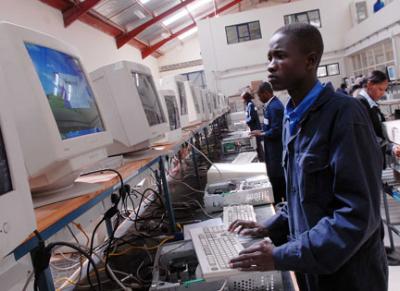Sainsbury’s Goes Bananas For Fair Trade PC Donations

The retailer is donating retired PCs to Fair Trade Banana producers in Ecuador and health projects in Africa
Retailer Sainsbury’s is donating more than 4000 of its PCs to health and education projects in South America and Africa, in a move which the retailer claims will extend the useful life of the machines by at least three to four years.
Sainsbury’s has donated the 4390 PCs and 4572 monitors to IT charity Computer Aid, which will handle the refurbishment of the devices, including wiping any sensitive information on the machines before they are shipped to developing countries such as Eritrea and Ecuador. According to Computer Aid, 256 PCs and monitors have already been sent to the Association of Small Banana Producers in Ecuador to help improve the day-to-day running of the Fair Trade organisation.
Other projects which will receive machines include the African Medical Research Foundation (AMREF) in Kenya which provides PCs to rural hospitals to help with remote diagnosis and treatment as well as the British Council in Eritrea which has a project to equip public libraries with PCs in the East African country.
“Computer Aid made donating these PCs extremely straightforward by assuming full legal liability for the equipment we sent and providing documentation to prove our compliance with electrical waste and payment card industry regulations,” said Rob Fraser, Sainsbury’s IT director. “I’m proud to say that our IT division already supports many local charities but with this donation to Computer Aid we are also able to make a difference to those in need even further afield.”
Jack Cunningham, Sainsbury’s environmental affairs manager, said that supporting Fair Trade projects with its old, but still usable, PCs made environmental sense. “As the UK’s largest retailer of Fair Trade products it’s exciting to be able to donate old IT equipment via Computer Aid to Fair Trade producers and the additional benefit is that we are continuing to divert a valuable resource from landfill. Both successes should be celebrated.”
In July, Sainsbury’s scooped top prize at the prestigious UK business awards for its work with NCR to cut the environmental impact of paper till receipts. The work resulted in the use of 502,000 fewer till rolls, where the NCR devices used 35 to 50 percent less energy than other till printers.
Computer Aid International says it has professionally refurbished over 150,000 PCs for use in schools, hospitals and community projects in more than 100 countries. The charity is an Authorised Approved Treatment Facility, licensed by the Environment Agency to handle equipment under the UK’s Waste Electrical and Electronic Equipment (WEEE) laws.

“Every PC refurbished by Computer Aid will go on to provide at least 6000 hours of computer access, which is enough time to train 60 children to a vocational level of IT literacy,” said Tony Roberts (pictured), founder and chief executive of Computer Aid.
Earlier this month, The Department for Business Innovation and Skills (BIS) announced that it had updated the UK’s Waste Electrical and Electronic Equipment laws to help improve the amount of old technology hardware which is recycled and kept out of landfill.
According to reports in the Independent this month, the head of an alleged UK tech recycling operation was questioned by police over illegal shipments of waste electronics to the Nigerian city of Lagos. The investigation by The Independent, Sky News and Greenpeace apparently showed how a broken television was shipped from the UK to an electronics market in the city.